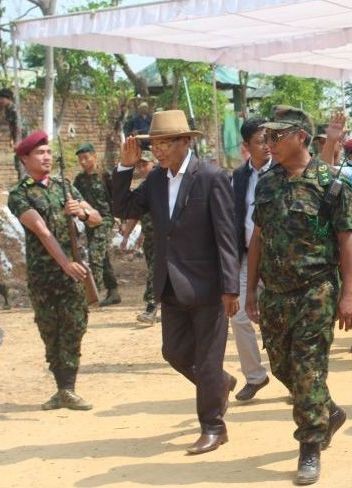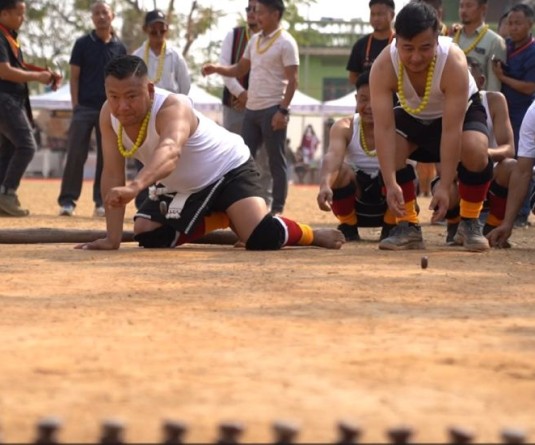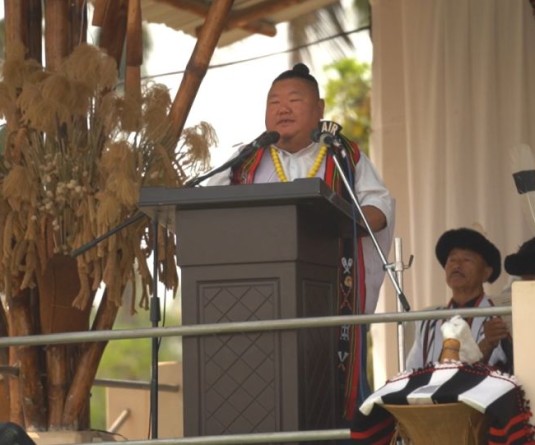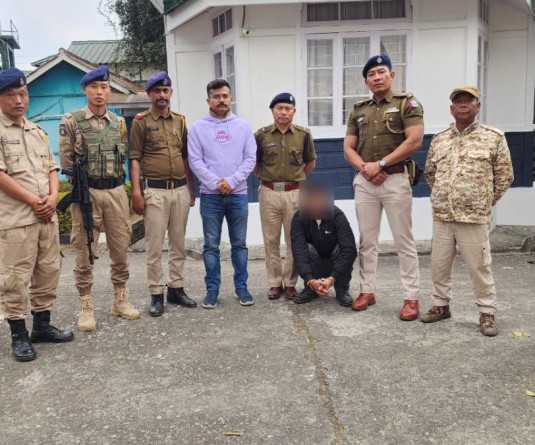General (Retired) MB Neokpao Konyak, President of the GPRN/NSCN (Neokpao-Alezo) attends an event. . (Morung File Photo)

Dimapur, April 13 (MExN): General (Retired) MB Neokpao Konyak, President of the GPRN/NSCN (Neokpao-Alezo), has stated that the recent ceasefire extension with the Government of India (GoI) under the Neokpao-Kitovi (NK) document was signed without his consent.
“I did not authorise G Naga (Ghukiho), team leader, or Chuba Tungoe, Secretary, to pursue the signing or extension of the ceasefire under my leadership,” Neokpao asserted in a statement received here.
“This unauthorised action raises serious concerns about the integrity of the process and the potential for further misunderstandings,” he added.
The development comes amid competing claims by two sides—one led by Neokpao and the other by Kitovi Zhimomi—that each has signed the extension of the ceasefire agreement for another year with the GoI.
The original agreement was signed with the unified GPRN/NSCN (Neokpao-Kitovi).
While acknowledging that records of the Union Ministry of Home Affairs reflect the registration of NSCN Unification as NSCN NK (Neokpao-Kitovi), Neokpao stated that this “technicality was miscarried over to the extension of ceasefire under the previous position.”
He maintained that the GoI is fully aware that NSCN Unification remains “firm and united under my leadership as the Chairman and Alezo Venuh as Ato Kilonser.” Further, all Regions and Sub-Regions are “intact and in position under the Council of Kilonsers,” he said.
“It is crucial that all parties involved recognise and respect the legitimacy of the NSCN Unification under my leadership and adhere to proper entity connotation,” Neokpao stated.
He further noted that after his expulsion from the NSCN Unification, Kitovi is “free to take his own course of decision as he desires, but should not create any stumping blockade in the peace process” with the GoI.
“The NSCN Unification has addressed his acts of Nepotism, Corruption, autocratic tendencies and bypassing the norms and constitution that led to his impeachment,” he said, adding that “the leadership of NSCN Unification never questioned his contributions to the Organisation or to the Naga National Political Groups (NNPGs).”
Neokpao added that if the ceasefire continues, and if Kitovi has “taken any undue advantages capitalising his initials in the records of the Government of India, the GoI will rectify it by all means, for such matters we Nagas should not be judgmental on the whole affairs.”
The President said the Nagas are currently at a “critical juncture, a crossroads of political transition,” calling for unity and composure.
“Internal conflicts and disagreements must be addressed within the Naga territories, not aired publicly,” he said. “This commitment to internal resolution and peace is the driving force behind the NSCN Unification under my leadership,” he added.
Referring to the March 22, 2025 incident at the Khehoyi Camp, Neokpao said it underscored the importance of patience and restraint.
According to him, despite being misled by adversaries “claiming a desire to join our government” and using the term ‘reconciliation’ to “sow discord and strengthen their position within the camp,” his leadership “exercised utmost tolerance.”
“My presence at the camp was instrumental in preventing any outbreak of violence,” he stated. This measured response was not born of weakness or inability but rather from a deep understanding of the potential consequences of internal strife. It was a conscious decision to prioritise the greater good and maintain stability, he held.
Neokpao said the Naga Freedom Movement must learn from past mistakes and avoid “repeating patterns of self-destruction” adding that internal conflicts have historically undermined the cause and brought hardship to the very people.
Thus, he emphasised that reconciliation must be comprehensive and acknowledge deep-seated divisions.
As President, he reaffirmed commitment to the spirit of the treaty between NSCN (K) and NSCN (IM) leaders, which led to the creation of the “neutral balancing force of NSCN Unification.”
This agreement enabled a ceasefire pact with the GoI signed on April 28, 2012, during his tenure as Commander-in-Chief of the Naga Army. The ceasefire remains in effect to this day, he added.
He also recalled that the NSCN Unification played a pivotal role in the formation of the NNPGs in 2016, which helped forge partnerships among like-minded Naga Political Groups in the ongoing peace talks with the GoI. The culmination of these efforts was the political agreement reached on October 31, 2019.
“We must not jeopardise this hard-won progress due to internal disputes or the personal agendas of individual leaders,” he cautioned. “The stakes are too high, and the potential consequences of failure too dire, to allow petty grievances to derail the pursuit of a lasting and just peace.”
He urged all Naga leaders to speak with one voice and proceed systematically in the political process.
The Nagas lost the opportunity for political solution in 1935 during the Partition of Burma and in 1947 during the Partition of India. Now, they must move step by step through political process and disprove conventions and notions of divisions, he said.
To this end, Neokpao appealed to the Naga people to contemplate, understand and extend their support and co-operation towards sincere and genuine reconciliation.






